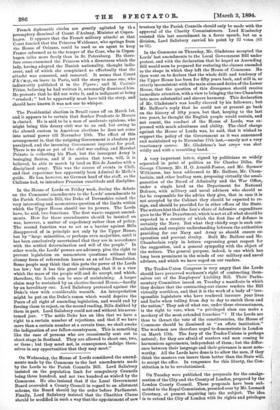In the Commons on Thursday, Mr. Gladstone accepted the Lords'
last amendments to the Local Government Bill under protest, and with the declaration that he hoped an Amending Bill would soon be prepared for restoring the clauses amended to the shape in which they left the House of Commons. He- then went on to declare that the whole drift and tendency of the Upper House has been for fifty years back, and still is, so utterly inconsistent with the main aims and duties of the Lower House, that the question of this divergence should receive immediate attention, with a view to bringing the two Chambers into more substantial and sincere harmony. This declaration of Mr. Gladstone's was loudly cheered by his followers ; but- Mr. Balfour's reply that he could not at present go back on the history of fifty years, but that, keeping to the last two years, he thought the English people would sustain, and not resent, the conduct of the House of Lords, was ex- pressed with much adroitness and ability. The chief charge- against the House of Lords was, he said, that it wished to support the policy of the Government as it was announced. and maintained up to November 17th last,—surely not a very reactionary corn-se. Mr. Gladstone's last arrow was shot wildly and with a trembling hand.






































 Previous page
Previous page